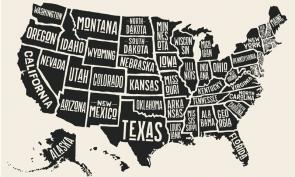How difficult is it to transition to the West Coast legal market from another region of the country? Is it imperative to have the bar in my state of interest as well as ties to the area?

Answer:
As someone who has made the transition from East Coast to West Coast and has helped several attorneys do the same, I can tell you that making the move to practice in California, Oregon, or Washington is immensely rewarding but has some inherent challenges (though not insurmountable ones). It's easy to see why this might be; these three states boast some of the most beautiful and livable communities in the country and are highly sought after destinations. The focus on quality of life and work/life balance on the West Coast stands in stark contrast to the hustle and bustle of many East Coast and Mid-Western metropolitan areas and is a very attractive counterpoint for burned out associates living in other regions. Obtaining a legal position in any of these three states is challenging but worth it-and having the Bar and ties to the area are immensely helpful, if not imperative in some cases. It's important to know what to expect, what is possible, and how to best proceed in your search. Below are some quick pointers that may be useful.
California
California is one of the most sought after destinations for attorneys in the country (and increasingly the world) and has become an increasingly competitive market, particularly in general litigation where jobs have been scarce. Both Northern and Southern California boast beautiful terrain and weather and high quality of life. But obtaining a position here as an out of state lateral can be difficult. Two very important tips: First, sitting for the California Bar (or at least stating your intention to do so) is an absolute imperative for anyone seeking to make the move here. California does not offer reciprocity with any other state in the US so all new attorneys must take the Bar exam in either February or July (considered by many to be the toughest exam in the country with pass rates averaging around 35%). There are several firms with whom we work who will not even look at resumes of candidates who do not yet have the California Bar. If not yet admitted, stating on your resume (under Bar Admissions) that you are sitting for the next California Bar exam is a must. There is some latitude here with transactional attorneys; firms are more willing to consider out of state transactional associates than they are litigation associates. That said, litigation superstars will often be considered (Top 5 law school and stellar grades and experience) with the expectation that the candidate will take the next bar exam.
Second, ties to the state or area are also very important. We are almost always asked by firms, "What are this person's ties to the area? Why do they want to move here?" This matters more in some areas of the state than others but being able to state that you have family, former connections to the area (lived there previously; attended school there), or at least friends residing in the state is key. Firms want to know that you are serious about making the move before they invest precious time and resources in your candidacy, so clearly demonstrating any connections to your city or region of choice is imperative. For smaller markets like Sacramento or San Diego, ties to the area are non-negotiable. I recently had a recruiter in Sacramento tell me that the firm would not consider my candidate because she couldn't demonstrate that she had ties that were strong enough to the city (this is also true of Seattle and Portland, by the way. More on that below). It's as if firms decide for you that you will not be happy in an area if you don't have sufficient, existing connections (and are afraid you will leave) and will therefore not take you seriously as a candidate.
Oregon and Washington
These two states are sufficiently similar in their approaches to hiring out of state attorneys that they can be adequately grouped together. Like California, Oregon and Washington offer beautiful landscapes, relaxed and friendly communities, and a work/life balance that includes a heavy focus on the outdoors. However, breaking into these markets can be quite daunting for non-locals.
When thinking of working in Oregon and Washington, think about a stereotypical New England town: they like their own! Oregon and Washington are two of the toughest markets in the country to penetrate for this reason; ties to the state are not just important-they are the primary jumping off point for consideration. Oregon and Washington firms are notorious for only wanting candidates who are originally from these states or who have lived or studied here in the past. The reason is simple: weather! Practitioners in Oregon and Washington have seen their fair share of attorneys who decide they want to practice there and then leave within a year or two because they can't handle the cold, the fog, the rain or all of the above! Firms are even more wary of candidates coming from the Southern California region who are used to perpetual sun and warm weather.
Unlike California, there is reciprocity with the bar in both Washington and Oregon. Admission requirements are different for each state to be sure and check the bar websites for both states before beginning the process. It is also important to note many law firms in these states prefer candidates to have the Washington and Oregon bars (once you are admitted to one, you can waive into the other). There is a lot of collaboration and cross-over work between the two states, so firms are requesting this more and more (many current job postings state that they prefer admission to both states' bars).
When beginning a job search for any of these states, it is of course wise to be realistic about the desirability of your practice area. In California, IP Litigation and Patent Prosecution (specifically for associates with technical degrees) are practice areas where the demand exceeds the current pool of viable applicants-so there may be more flexibility in these areas regarding the Bar and ties to the area. Corporate M&A associates are also in high demand in both Northern and Southern California. In Oregon and Washington, Intellectual Property is also a strong practice, as are Tax, Trusts & Estates, and Corporate.
Remember that any job search can take up to several months but this time frame is always lengthened when making a move to another state, particularly competitive states like California, Oregon, and Washington. To ensure success, become familiar with the practice areas that are in the most demand in your state of interest as well as the cultural mores and requirements that drive hiring decisions.
See Guidelines on Reciprocity or "Admission On Motion" among the States as per American Bar Association for more information.
CLICK HERE TO SEARCH JOBS IN OTHER STATES!
About Harrison Barnes
No legal recruiter in the United States has placed more attorneys at top law firms across every practice area than Harrison Barnes. His unmatched expertise, industry connections, and proven placement strategies have made him the most influential legal career advisor for attorneys seeking success in Big Law, elite boutiques, mid-sized firms, small firms, firms in the largest and smallest markets, and in over 350 separate practice areas.
A Reach Unlike Any Other Legal Recruiter
Most legal recruiters focus only on placing attorneys in large markets or specific practice areas, but Harrison places attorneys at all levels, in all practice areas, and in all locations-from the most prestigious firms in New York, Los Angeles, and Washington, D.C., to small and mid-sized firms in rural markets. Every week, he successfully places attorneys not only in high-demand practice areas like corporate and litigation but also in niche and less commonly recruited areas such as:
- Immigration Law
- Workers Compensation
- Insurance
- Family Law
- Trust and Estate
- Municipal law
- And many more...
This breadth of placements is unheard of in the legal recruiting industry and is a testament to his extraordinary ability to connect attorneys with the right firms, regardless of market size or practice area.
Proven Success at All Levels
With over 25 years of experience, Harrison has successfully placed attorneys at over 1,000 law firms, including:
- Top Am Law 100 firms such including Sullivan and Cromwell, and almost every AmLaw 100 and AmLaw 200 law firm.
- Elite boutique firms with specialized practices
- Mid-sized firms looking to expand their practice areas
- Growing firms in small and rural markets
He has also placed hundreds of law firm partners and has worked on firm and practice area mergers, helping law firms strategically grow their teams.
Unmatched Commitment to Attorney Success - The Story of BCG Attorney Search
Harrison Barnes is not just the most effective legal recruiter in the country, he is also the founder of BCG Attorney Search, a recruiting powerhouse that has helped thousands of attorneys transform their careers. His vision for BCG goes beyond just job placement; it is built on a mission to provide attorneys with opportunities they would never have access to otherwise. Unlike traditional recruiting firms, BCG Attorney Search operates as a career partner, not just a placement service. The firm's unparalleled resources, including a team of over 150 employees, enable it to offer customized job searches, direct outreach to firms, and market intelligence that no other legal recruiting service provides. Attorneys working with Harrison and BCG gain access to hidden opportunities, real-time insights on firm hiring trends, and guidance from a team that truly understands the legal market. You can read more about how BCG Attorney Search revolutionizes legal recruiting here: The Story of BCG Attorney Search and What We Do for You.
The Most Trusted Career Advisor for Attorneys
Harrison's legal career insights are the most widely followed in the profession.
- His articles on BCG Search alone are read by over 150,000 attorneys per month, making his guidance the most sought-after in the legal field. Read his latest insights here.
- He has conducted hundreds of hours of career development webinars, available here: Harrison Barnes Webinar Replays.
- His placement success is unmatched-see examples here: Harrison Barnes' Attorney Placements.
- He has created numerous comprehensive career development courses, including BigLaw Breakthrough, designed to help attorneys land positions at elite law firms.
Submit Your Resume to Work with Harrison Barnes
If you are serious about advancing your legal career and want access to the most sought-after law firm opportunities, Harrison Barnes is the most powerful recruiter to have on your side.
Submit your resume today to start working with him: Submit Resume Here
With an unmatched track record of success, a vast team of over 150 dedicated employees, and a reach into every market and practice area, Harrison Barnes is the recruiter who makes career transformations happen and has the talent and resources behind him to make this happen.
A Relentless Commitment to Attorney Success
Unlike most recruiters who work with only a narrow subset of attorneys, Harrison Barnes works with lawyers at all stages of their careers, from junior associates to senior partners, in every practice area imaginable. His placements are not limited to only those with "elite" credentials-he has helped thousands of attorneys, including those who thought it was impossible to move firms, find their next great opportunity.
Harrison's work is backed by a team of over 150 professionals who work around the clock to uncover hidden job opportunities at law firms across the country. His team:
- Finds and creates job openings that aren't publicly listed, giving attorneys access to exclusive opportunities.
- Works closely with candidates to ensure their resumes and applications stand out.
- Provides ongoing guidance and career coaching to help attorneys navigate interviews, negotiations, and transitions successfully.
This level of dedicated support is unmatched in the legal recruiting industry.
A Legal Recruiter Who Changes Lives
Harrison believes that every attorney-no matter their background, law school, or previous experience-has the potential to find success in the right law firm environment. Many attorneys come to him feeling stuck in their careers, underpaid, or unsure of their next steps. Through his unique ability to identify the right opportunities, he helps attorneys transform their careers in ways they never thought possible.
He has worked with:
- Attorneys making below-market salaries who went on to double or triple their earnings at new firms.
- Senior attorneys who believed they were "too experienced" to make a move and found better roles with firms eager for their expertise.
- Attorneys in small or remote markets who assumed they had no options-only to be placed at strong firms they never knew existed.
- Partners looking for a better platform or more autonomy who successfully transitioned to firms where they could grow their practice.
For attorneys who think their options are limited, Harrison Barnes has proven time and time again that opportunities exist-often in places they never expected.
Submit Your Resume Today - Start Your Career Transformation
If you want to explore new career opportunities, Harrison Barnes and BCG Attorney Search are your best resources. Whether you are looking for a BigLaw position, a boutique firm, or a move to a better work environment, Harrison's expertise will help you take control of your future.
Submit Your Resume Here to get started with Harrison Barnes today.
Harrison's reach, experience, and proven results make him the best legal recruiter in the industry. Don't settle for an average recruiter-work with the one who has changed the careers of thousands of attorneys and can do the same for you.
About BCG Attorney Search
BCG Attorney Search matches attorneys and law firms with unparalleled expertise and drive, while achieving results. Known globally for its success in locating and placing attorneys in law firms of all sizes, BCG Attorney Search has placed thousands of attorneys in law firms in thousands of different law firms around the country. Unlike other legal placement firms, BCG Attorney Search brings massive resources of over 150 employees to its placement efforts locating positions and opportunities its competitors simply cannot. Every legal recruiter at BCG Attorney Search is a former successful attorney who attended a top law school, worked in top law firms and brought massive drive and commitment to their work. BCG Attorney Search legal recruiters take your legal career seriously and understand attorneys. For more information, please visit www.BCGSearch.com.
Harrison Barnes does a weekly free webinar with live Q&A for attorneys and law students each Wednesday at 10:00 am PST. You can attend anonymously and ask questions about your career, this article, or any other legal career-related topics. You can sign up for the weekly webinar here: Register on Zoom
Harrison also does a weekly free webinar with live Q&A for law firms, companies, and others who hire attorneys each Wednesday at 10:00 am PST. You can sign up for the weekly webinar here: Register on Zoom
You can browse a list of past webinars here: Webinar Replays
You can also listen to Harrison Barnes Podcasts here: Attorney Career Advice Podcasts
You can also read Harrison Barnes' articles and books here: Harrison's Perspectives
Harrison Barnes is the legal profession's mentor and may be the only person in your legal career who will tell you why you are not reaching your full potential and what you really need to do to grow as an attorney--regardless of how much it hurts. If you prefer truth to stagnation, growth to comfort, and actionable ideas instead of fluffy concepts, you and Harrison will get along just fine. If, however, you want to stay where you are, talk about your past successes, and feel comfortable, Harrison is not for you.
Truly great mentors are like parents, doctors, therapists, spiritual figures, and others because in order to help you they need to expose you to pain and expose your weaknesses. But suppose you act on the advice and pain created by a mentor. In that case, you will become better: a better attorney, better employees, a better boss, know where you are going, and appreciate where you have been--you will hopefully also become a happier and better person. As you learn from Harrison, he hopes he will become your mentor.
To read more career and life advice articles visit Harrison's personal blog.






